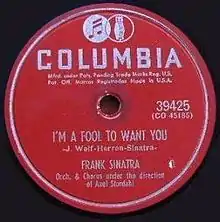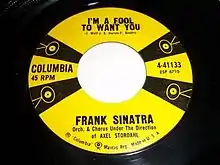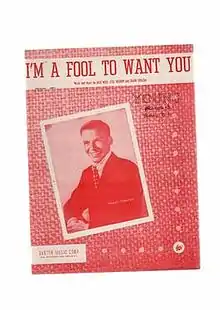I'm a Fool to Want You
"I'm a Fool to Want You" is a 1951 song composed by Frank Sinatra, Jack Wolf, and Joel Herron.[1] Frank Sinatra co-wrote the lyrics and released the song as a Columbia Records single. The ballad is considered a pop and jazz standard.


Background

Frank Sinatra first recorded the song with the Ray Charles Singers on March 27, 1951, in an arrangement by Axel Stordahl in New York. It was the second song recorded at the sessions that began with "I Whistle a Happy Tune" and ended with "Love Me". He recorded a second version at the Capitol Records Tower in Hollywood on May 1, 1957, arranged and conducted by Gordon Jenkins, which was released in 1957 on the album Where Are You?. This album was Sinatra’s first stereo recording. Capitol also released the song as part of an EP, EAP-2-855, EBFI-855.
The song was released as a Columbia Records 10" 78 B side single in 1951 backed with "Mama Will Bark" (with Dagmar) as #39425, Matrix # CO-45185-1. The single reached #14 on the Billboard pop singles chart in a seven-week chart run beginning in June and #27 on Cashbox the same month in a 5-week chart run.[2] "Mama Will Bark" reached #21. The song was re-released in 1954 as an A side Columbia single with "If I Forget You" as the B side. Columbia also released the song as part of an EP, 2559, which also featured "I Should Care", "I Could Write a Book", and "If You Are But a Dream".
The Columbia recording appeared on the 1966 album Frank Sinatra's Greatest Hits: The Early Years, Volume Two. The song also appeared on the 1986 4-disc collection The Voice: Frank Sinatra, the Columbia Years (1943–1952) and the 1993 box-set album The Columbia Years 1943-1952: The Complete Recordings. The song also appeared on Frank Sinatra: The Best of the Columbia Years: 1943-1952 in 1995 and Frank Sinatra Sings His Greatest Hits in 1997 both on Columbia. In 2003, the song was included on the Sony collection The Essential Sinatra: The Columbia Years.
The song was featured on the 1992 Sinatra: Soundtrack to the CBS Mini-Series released on Reprise Records.
The song has become a pop and jazz standard that has been recorded by more than 100 other performers.[3]
References
Sources
- Granata, Charles L. (1999). Sessions with Sinatra: Frank Sinatra and the Art of Recording. Chicago Review Press. ISBN 1-55652-509-5
- Phasey, Chris (1995). Francis Albert Sinatra: Tracked Down (Discography). Buckland Publications. ISBN 0-7212-0935-1
- Summers, Antony and Swan, Robbyn (2005). Sinatra: The Life. Doubleday. ISBN 0-552-15331-1